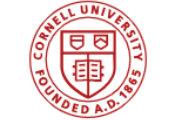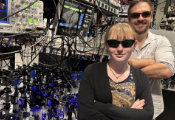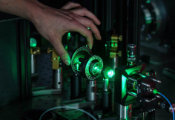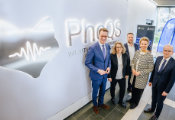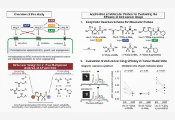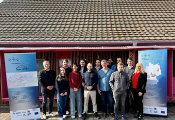Abu Dhabi’s Technology Innovation Institute Transforms Aerospace and Automotive Design With Quantum-Inspired Fluid Simulations
Abu Dhabi, UAE, December 04, 2024 -- The Technology Innovation Institute (TII), the applied research arm of Abu Dhabi’s Advanced Technology Research Council (ATRC), has unveiled a quantum-inspired framework that transforms how fluid dynamics simulations are conducted. The work was executed by the Quantum Research Center in collaboration with the Propulsion and Space Research Center, both excellence R&D centers at TII. By leveraging advanced algorithms derived from quantum mechanics principles, this innovation promises to redefine the design processes for aerospace, automotive, and energy sectors.
Fluid dynamics—the study of how air, water, and other fluids move—is central to optimizing designs in fields such as aircraft development, vehicle aerodynamics, and nuclear energy systems. However, conventional simulation techniques require immense computational resources and lengthy processing times, often impeding iterative design improvements. TII’s framework overcomes these limitations by employing quantum-inspired tensor network algorithms to compress and process data with unprecedented efficiency, achieving drastic memory reductions for airfoil simulations.
Revolutionizing Design Across Industries
The framework’s unique ability to deliver detailed, rapid simulations on standard computing hardware democratizes access to advanced fluid dynamics capabilities. For example, aerospace engineers can now simulate airflow around diverse wing shapes faster, enabling more efficient aircraft designs. Automotive designers can optimize vehicle aerodynamics to improve fuel efficiency and reduce emissions. In the energy sector, nuclear engineers can refine coolant flow dynamics for enhanced safety and performance.
“This innovation addresses a critical bottleneck in simulation-driven design processes,” said Dr. Najwa Aaraj, CEO of TII. “Our quantum-inspired framework empowers researchers and engineers to push the boundaries of innovation, driving advances in sectors where precision fluid dynamics is essential.”
Quantum-Inspired Algorithms: Bridging Today’s Technology with Tomorrow’s Potential
While quantum computing remains on the horizon, TII’s approach harnesses quantum-inspired principles—notably tensor network algorithms—to bring immediate benefits using existing classical computing systems. These algorithms simulate large-scale fluid dynamics with exceptional data compression, making high-fidelity simulations feasible without requiring specialized hardware.
Prof. Leandro Aolita, Executive Director of the Quantum Algorithms Division at TII, explained: “Quantum-inspired algorithms offer a practical bridge between today’s classical computing capabilities and the promise of quantum technology. By applying these advanced techniques, we can deliver efficient, scalable solutions to industries where physics-based predictions are vital.”
TII’s framework has already received international acclaim, being named a finalist in the Airbus-BMW Quantum Mobility Challenge. The proposal showcased the framework’s ability to simulate airflow around wing-like structures using compressed data representations, demonstrating its transformative potential for aerospace and automotive applications.
The recognition underscores the framework’s practical utility for engineers and designers seeking to refine products and systems with reduced environmental impact. Faster simulations facilitate iterative design processes, enabling the development of lighter, more efficient vehicles and aircraft with improved aerodynamic performance.
Addressing Complex Challenges with Advanced Research
Traditionally, simulating fluid dynamics demanded either extensive physical experiments or high-performance computing resources, limiting accessibility and scalability. TII’s framework shifts this paradigm by streamlining simulations without compromising accuracy. This capability empowers scientists and engineers to predict complex fluid behaviors in real-world scenarios, unlocking new possibilities for innovation.
“Our work is a testament to the potential of quantum-inspired technology to address pressing challenges across industries,” added Dr. Aaraj. “By rethinking how we simulate and analyze fluid dynamics, we’re helping to accelerate advancements in mobility and energy solutions that are both efficient and sustainable.”

